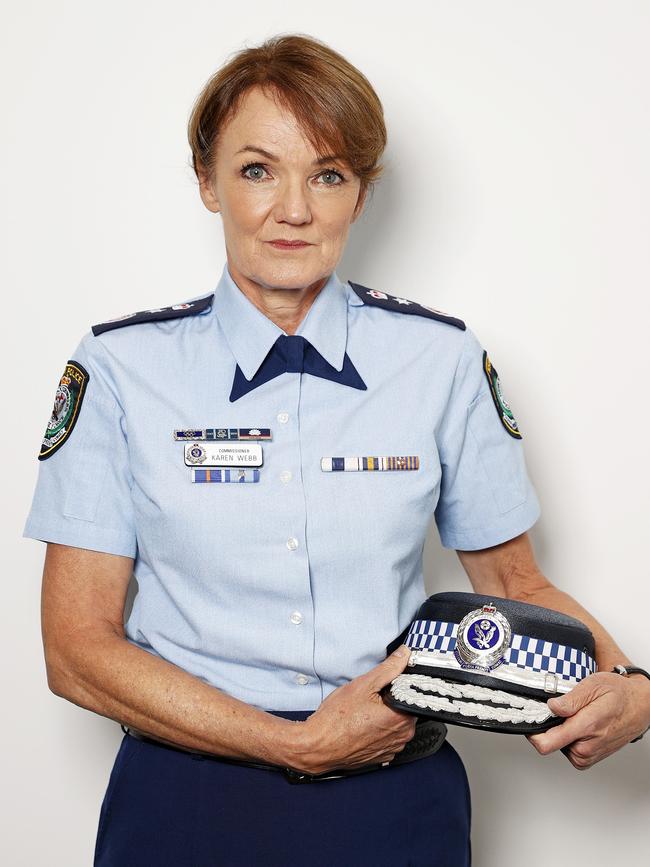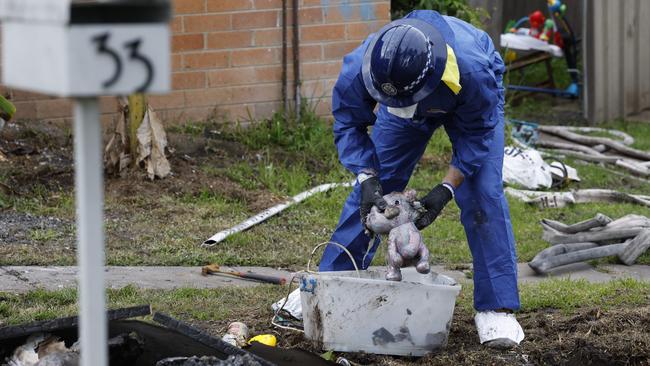NSW domestic violence ‘cowards’ revealed as Police Commissioner calls for change
These men attacked women in acts of so-called ‘domestic violence’ but we don’t think that term goes far enough — from now on The Daily Telegraph will call them what they really are: coward attacks.
Police & Courts
Don't miss out on the headlines from Police & Courts. Followed categories will be added to My News.
The state’s most senior police officer has labelled men who bash, choke and kill their partners as “cowardly monsters” and said it’s time society put the blame squarely on their shoulders.
“They have a choice and they are choosing violence,” Commissioner Karen Webb said in an exclusive interview with The Daily Telegraph.
“So let’s peel back the layers and say: ‘Who’s responsible here?’
“The minute you start blaming police, or anyone else for that matter, all you are doing is taking the blame off where it belongs and that is fairly and squarely on the offenders.
“The minute we look at the contributing factors, like drugs or alcohol, we are taking away from the fact that these cowards are making a choice.”
The Commissioner said it was time to “stand together as a society and ask ourselves: ‘What are we prepared to accept?’
“How many deaths are we prepared to accept? I would suggest not even one death is acceptable to any of us.”

The Commissioner’s comments come after a devastating week in Sydney, which saw the death of a two-year-old and six-year-old boy and a five-month-old girl in a house fire. A woman, three boys and a nine-year-old girl escaped the blaze.
A 28-year-old man is facing three counts of murder and five counts of attempted murder.
In response to the rise in violence in NSW homes, The Daily Telegraph has launched a campaign aimed at changing the attitude towards evil in our homes, by changing the language and by calling out perpetrators and calling them what they are — cowards.
Commissioner Webb said it was time for “no more excuses”.
“It’s a sickening crime and we as a society need to treat it as such. It has been a priority of mine since I became commissioner,” she said.
“We have put a series of things in place like the DV registry and the Empower You phone app for people not ready to come to the police to log a record of the violence and coercive control they are experiencing.
“But here I am still sitting here having this conversation, that this violence is still happening and it’s time we all work together.”

In NSW there are 92,000 AVOs in place at any one time, and police are called for assistance every four minutes — that’s 400 a day.
Calls to violence in the home take up 60 per cent of general duties officers’ time.
In the last 12 months NSW police have had 28,000 interactions over coward attacks – 40 per cent of those interactions have been proactive compliance checks for known offenders.
Women’s Community Shelters education director Dannielle Miller said “domestic violence” implied “normality” but the attacks are “much more graphic and shocking than that”.
She also supported a push to name and shame the offenders instead of only counting dead.
“The existing rhetoric isn’t working so we are open to new ideas and new language to cut through,” she said.
Ms Miller said she was worried the shocking recent rise in violence in the home could cause a “contagion effect” if the focus was not on the attackers.
“We have had our highest rate of domestic violence since we have been keeping records this year … while tallying women is important because every woman is important, I fear it is creating a fear that this is inevitable,” she said.
“Perhaps there are people thinking maybe killing her is the answer? We need them to know they will be outliers, they will be shunned by us and it’s not acceptable in our community.”
On Friday morning, NSW Premier Chris Minns said The Daily Telegraph was “100 percent right” to call out “all those cowards that have committed domestic violence particularly against women and children ‘’.
“I think that that language is long overdue, “ the Premier said at a press conference on the South Coast.
“It cannot be habituated into our community that these horrific acts of community violence can be normalised through language and I think the Telegraph’s spot on they’re totally spot on when I say these are cowardly attacks by people on vulnerable, vulnerable members of our society.
“And those that commit those acts that are found guilty of it in a court should be absolutely labelled and stigmatised in our community.”
Mr Minns said there was no other way of dealing with this scourge in our community other than calling out for what it is and that is a disgusting cowardly attack on a vulnerable person.

Relationships Australia NSW chief executive Elisabeth Shaw supported changing the term “domestic violence” to something that did not normalise abuse- but did not offer a specific term.
She would like the change in language to apply on “all levels”, including in the community, in the legal system and among the police.
“If we call it an assault, we know it is a crime but calling it a ‘domestic’ makes it sound like an ordinary thing that happens in the home,” she said.
“We domesticate abuse.”
Men’s family violence case worker Moe, who asked to keep his last name protected for privacy, said changing the description of domestic violence would help in the same way as campaigns about speeding.
He referenced the popular speeding campaign where people pointed their pinky finger and shamed those who boasted about speeding.
“I think it would definitely work to make it a negative thing in society rather than ‘just domestic violence’,” he said.
“All it takes is one person or a few people to say it … when someone is talking about DV at the pub, all it takes is for someone to say: Hey mate, that’s not right’.”
In NSW there are about 2500 reports of domestic violence to the police every month – but this likely represents only 40 per cent of actual incidents due to underreporting.
As of this week, 41 Australian women have died at the hands of someone they know this year.
Australian women are nearly three times more likely than men to experience violence from an intimate partner.




